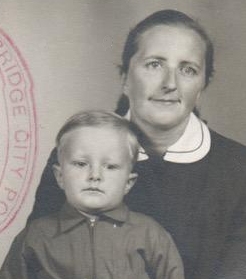Letter to France, 1946

Eric Sheldon discovered amongst his mother's papers a letter written by her on 1st September 1946 relating to our School. [Eric has translated the letter from French.] His mother (then Jacqueline Gain, shown in a photo from 1960 by which time she was in Cambridge) came to EGS in 1946 from France to serve for a year as the French Assistant. She boarded in Worsley with the Weir family. She wrote the following letter to her parents in that year, telling about her time there. Though it was immediately after WWII (during which Jacqueline had lived in a very war-torn country), the character of the School sounds surprisingly familiar. Jacqueline went on to have a distinguished career -- studying English Literature at the University of California, Berkeley, then teaching at Cambridge University. Eric (with his mother in the photo) very kindly tracked me down, and sent the charming letter. We are grateful for this chance to relate a long-ago story about the school.
"The grammar school at which I'm teaching is a large co-educational school with 500 students in Eccles, a district west of Manchester (population 400,000). I teach all 500 pupils in 18 forty-minute classes per week. They are aged from 10 to 16, and wear a bottle-green uniform. They are mostly pink-cheeked, with blond, curly hair, and are smiling and well-behaved. I was introduced to the headmaster by the maths teacher, who is a neighbour and friend of William, who also teaches at the school. The headmaster warmly welcomed me and introduced me to the staff of 18 teachers. Everyone is going out of their way to be helpful in every area of school life.
"I teach from Monday morning to Thursday afternoon. Here is a typical day. I get up at the same time as the Weir family, at 6:30. I take the bus to Eccles (6 km away) alongside two science teachers. School begins at 8:50, with ten minutes of prayers and hymns. This is followed by four classes, separated by 5-minute breaks, during which everyone has a cup of tea. The teachers have lunch together in the hall. I sit at the ladies' table. All very friendly. After that I join the other female teachers in the ladies' staff room, where we drink more tea and chat in front of the fire. More classes from 1:30 to 3:30, after which I take the bus home around at 4:30 and prepare for the following days' classes.
"There are three French teachers -- one man and two women. They want to get the maximum benefit from my teaching, so they often attend my classes. I cover pronunciation, reading comprehension, and conversation. By all reports I speak clearly and have excellent diction! I am happy to follow the other French teachers' suggestions as to teaching methods. I feel very much at home at the school, especially as there is a lot of goodwill and solidarity between teachers. In short, I feel that I've made an excellent start. I'm delighted to have been recommended by Mr. Pearson (a neighbour and friend of Mr. Weir) and I feel that I'm in a very friendly and supportive environment.
"A reporter visited yesterday; he was planning to write an article about my exploits in the Resistance! Unfortunately I wasn't able to relate any, but he was greatly interested in my job as an interpreter and my other duties at the International Centre for the Study of the Renewal of Liberalism. I now have my English identity card and ration book. Lots of questions from the Police, but I didn't have to answer any queries about my parents, as I am no longer a dependent, and I'm sure that you would prefer it that way. [See 'Explanatory Note' at bottom.] I don't see many signs of destruction from the war, but there is less butter available than in 1939. Life is comfortable in some ways but people try to keep hunger at bay by eating small quantities six or seven times a day."
Explanatory Note: Jacqueline's father was the Vice-chancellor of Lyon University during WWII. One day a group of German soldiers arrived with posters that encouraged young French men to join the Wehrmacht, and ordered that he put them up in the lecture halls; he refused, but acceded when threatened with being shot on the spot. After the war, he was charged with being a collaborator but was fully exonerated several years later. At the time the letter was written he was probably officially regarded as a collaborator.